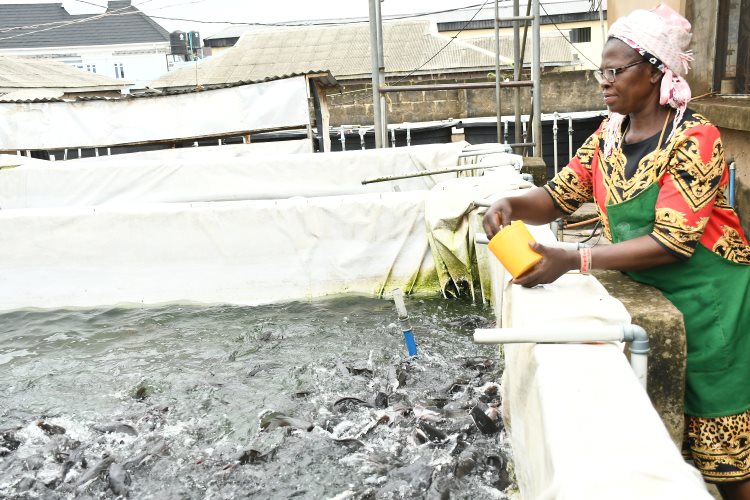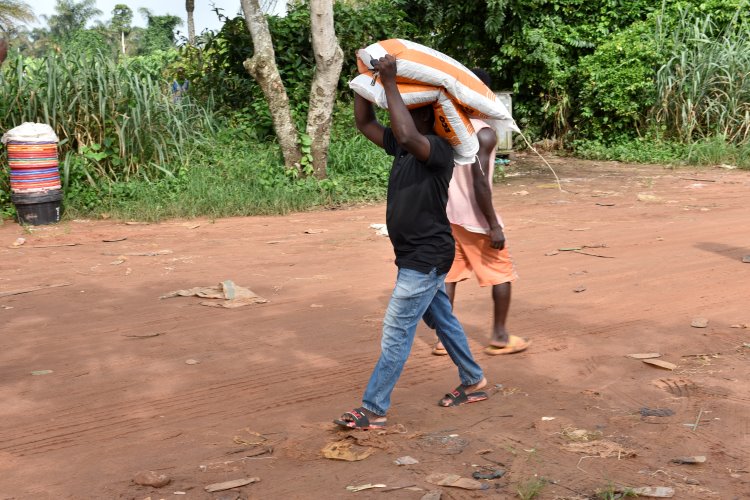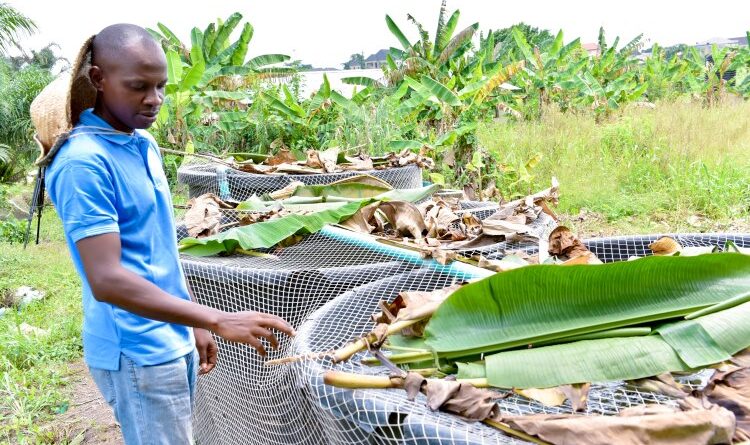Expanding The Frontiers Of Impact Beyond Feed… Olam Agri’s Journey Of Transforming Fish Farming In Nigeria
Limiting challenges and untapped potential
Fish provides essential nutrition for 3.3 billion people in the world. Both primary fisheries and aquaculture employ 58.5 million people globally.
Somehow, the potential of the fish farming value chain in Nigeria was largely untapped until recently. In the past six years, there has been a significant leap in production, employment generation and overall economic contributory levels of the sector – thanks to Olam Agri’s investment drive and the efforts by the Federal Government and relevant global agencies.

The company’s investment journey in Nigeria’s aquaculture sector began in 2017 through its integrated feed milling unit.

In that period the challenges confronting the sector were enormous. Matthew Tan, a global expert on aquaculture who was engaged to work with the local fish farmers that year identified some of the challenges associated with the sector as unsustainable husbandry and poor feeding practices among farmers, inbreeding problems, lack of water monitoring capability and lack of basic biosecurity.
Consequently, the local Feed Conversation Ratio (FCR) and hatchery mortality rate were high. Brood stock growth phases and harvest sizes were poor due to the alarming inefficiency in the sector, a result of a rooted knowledge gap.
Corroborating the poor state of the sector in that period, Olawale Onada, the Regional Technical Manager for the Olam Agri feed milling unit covering Southwest 1, said, “Farmers had low knowledge of trendy pond management techniques. They were ignorant of pond PC and water measurement parameters. They lacked pond disease management knowledge. They didn’t know that it was important to test their water before they started farming. They believed that once there was a pond they could go ahead and start farming. Therefore, the pond mortality rate was high. The pond yield was low, and their farm yield and return on investment were badly affected.”
A timely intervention
Olalere Ambali, an aquaculture technical executive who also works with Olam Agri’s feed milling unit explained, “When we started working with the farmers, a good number of them were using traditional feed which had low nutritional value. Also, most of the farm clusters we visited initially had ponds that had high ammonia levels causing high breed mortality. The technical inputs in the fish farms were poor.”
The aquaculture sector underperformed regardless of past policy interventions and public-private investment efforts until Olam Agri’s feed milling unit deployed its broad technical and milling capabilities to address the various hurdles negating growth.
Capturing the pre-2017 state of the sector further, a research work by Delta State University put the total production output in the country at a ‘meagre 200,000’ despite the availability of 1.75 million hectares of arable land suitable for fish farming around the country.
The inefficiencies in the sector compounded the issues around food security. According to the report, whereas fish products provide around 60% of the required daily protein intake for rural adults in the country, the poor performance of the aquaculture sector meant a larger segment of the population was only able to access 8 grams daily animal protein intake against the 35 grams recommended by the Food and Agriculture Organisation (FAO).
To arrest the sector’s inefficiencies, the global expert engaged by Olam Agri and a team of trained local technical staff embarked on fish farm cluster engagements across the country.
A sector on a resurgence
Speaking about Olam Agri’s engagements Matthew Tan, the expert, said, “The global aquaculture sector is expected to grow at 5.5 percent CAGR reaching USD 421.2 billion in 2030. Nigeria has always had a huge potential to tap this growing market to improve its food security and economic position. We saw the potential in the country’s aquaculture sector in 2017. We decided to work with the local fish farmers to alleviate the challenges hampering growth. We developed a set of training and farming protocols for farmers in the country. We conducted hundreds of training sessions with thousands of farmers in attendance.”
He expatiated, “Hundreds of farming co-operatives participated in our training programs. Over time as farmers began to implement the knowledge gleaned through the training, we started to see improvements in pond survival and final harvest in the farming community across the country. The growth in the aquaculture sector underlines the value of Olam Agri’s Seeds for the Future (SFTF) initiative. The SFTF is the agribusiness social sustainability investment vehicle. It focuses on five key levers, which are supporting farmers and farming communities, enabling broader education & skill development for young people, empowering women (farmers & bakers), promoting health & nutrition, and reducing carbon emissions in business operations.”
Olawale and Olalere who were part of Olam Agri’s executive technical team captured the experience. Olawale said, “Immediately we entered a community we identified new prospects that needed technical inputs. For instance, at the Asejere and Kajola fish farm clusters located in Ijebu-Ode, Ogun State, two of the largest fish farm clusters in West Africa, we introduced the farmers to the best global fish farm management practices comprising hatchery management, PC collection, feed and feeding management, water quality management and disease management. We ran trials on their farms to give them first-hand knowledge of these best management practices. They have been able to adopt these practices and confirmed improvements in their yield and incomes.”
He added that farmers who previously had 20 ponds were able to grow their businesses to expand to around 40 ponds because of adopting the knowledge and tools delivered by the team.
Also, Olalere reiterated the impact of the company’s business investment efforts making mention of how it produced and delivered quality fish feed that aided the growth of brood stock, reduced pond mortality rate and farms’ cost of production.
Olam Agri’s animal feed brands comprising EcoFloat, Blue Crown, Aqualis and Alpha are full-floating freshwater fish feed.
The brands are specifically tailored to the needs of the African catfish and farming practices in Nigeria. They are rich in amino and protein balance; thereby fostering faster fish stock growth.
The brands presently offer balanced nutrition for best-in-class feed conversion ratios to more than 15,000 local fish farmer businesses in the country.
Attesting to growth in the fish farming value chain, the Food and Agriculture Organisation (FAO) said in 2021 that Nigeria has been able to achieve the production of over 1 million metric tons of fish annually. It put the estimated value of the country’s annual production at USD 2.6 billion.
The catfish value chain was said to offer employment to around 1 million people while the estimated number of fish farmers increased to 285,000.
Acknowledging Olam Agri’s investment efforts in the value chain, Oropo Abiola, a fish farmer who operates in the Kajola fish farm cluster in Ijebu Ode, said, “Olam Agri came to our farm cluster and trained us on pond water management techniques, how to test PH level in the pond, and ways to curb feed waste. They helped us understand the science of catfish farming, especially how to create the right environment for the fish to thrive. These efforts have really impacted our businesses.”
Odafi Lazarus, a fish farmer in the Asejere farm cluster expatiated, “What Olam Agri is contributing to the industry is huge. When the business’ Eco-Float feed was introduced to us, we were able to cut waste and lower production costs in a way. The floating feed helps us measure livestock consumption. The feed floats, unlike the sinking pallet that goes down deep into the pond where we don’t know if the fish are consuming everything or not.”
Olatoye Fajimi, the Vice President of the Lagos State Catfish & Allied Farmers Association, who also runs a fish farm in the Itamaga fish farm cluster of Ikorodu, said, “Since feed is one of the most important inputs in fish farming, Olam Agri increased the availability of feed to farmers. They are helping farmers gain access to feed in an instant by localizing their production in key hubs here in Nigeria. They also employ technical experts as salespeople who go around to visit farms to work with the farmers to improve farm clusters productivity.”




